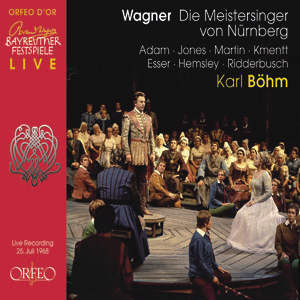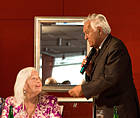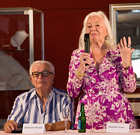
NEW RELEASES
NEW RELEASES of the last 12 months
COMING SOON
ARCHIVE
AWARDS
CDs
SACDs
LPs
MCs
CATALOGUE NUMBERS
|
|
ORFEO International – Catalogue
CDs
 | Richard Wagner
Die Meistersinger von Nürnberg Orfeo • 4 CD • 4h 16min Order No.: C 753 084 L |
|
Composers/Works: |
R. Wagner: Die Meistersinger von Nürnberg WWW 96
|
Artists: |
Theo Adam (Hans Sachs, Schuster - Baß)
Karl Ridderbusch (Veit Pogner, Goldschmied - Baß)
Sebastian Feiersinger (Kunz Vogelsang, Kürschner - Tenor)
Thomas Hemsley (Sixtus Beckmesser, Schreiber - Baß)
Dieter Slembeck (Konrad Nachtigall, Spengler - Baß)
Gerd Nienstedt (Fritz Kothner, Bäcker - Bariton)
Günther Treplow (Balthasar Zorn, Zinngießer - Tenor)
Erich Klaus (Ulrich Eißlinger, Würzkrämer - Tenor)
William Johns (Augustin Moser, Schneider - Tenor)
Heinz Feldhoff (Hermann Ortel, Seifensieder - Baß)
Fritz Linke (Hans Schwarz, Strumpfwirker - Baß)
Waldemar Kmentt (Walther von Stolzing, ein junger Ritter - Tenor)
Hans Franzen (Hans Foltz, Kupferschmied - Baß)
Gwyneth Jones (Eva, Pogners Tochter - Sopran)
Hermin Esser (David, Sachs' Lehrbube - Tenor)
Janis Martin (Magdalena, Evas Amme - Mezzosopran)
Kurt Moll (Ein Nachtwächter - Baß)
Chor der Bayreuther Festspiele (Chor)
Orchester der Bayreuther Festspiele (Orchester)
Karl Böhm (Dirigent)
|
The 
C 753 084 L

Presse conference on 29th of July 2008
Foto: Bayreuther Festspiele/Jörg Schulze1968 Bayreuth Festival opened with a new production of Die Meistersinger von Nürnberg that seemed to be heading for disaster when the central role of Hans Sachs had to be recast after the final dress rehearsal. But Theo Adam struck gold in the scene in his workshop in Act Three and later on the Festival Meadow, dispelling all possible misgivings: in Wolfgang Wagner’s first Bayreuth production of his grandfather’s only mature comedy, Adam created a multifaceted portrait of the cobbler-poet using all the resources of his striking bass-baritone voice, a voice that was penetrating in all its registers, yet also capable of great subtlety. 
Dame Gwyneth Jones and Theo Adam
Foto: Bayreuther Festspiele/Jörg Schulze

Dame Gwyneth Jones and Waldemar Kmentt
Foto: Bayreuther Festspiele/Jörg SchulzeIn the covered pit, Karl Böhm brought out the lyric colours and fleeter moments in the score, allowing the other singers, too, – o shine with their young and unspoilt voices. Waldemar Kmentt, for example, had largely been known as a Mozart tenor until then, but as the young knight Walther von Stolzing, his lean tone and ease of emission continue even today to set the highest standards in casting this role. This also served to bring his character closer to that of the apprentice David, heard here in an assumption by Hermin Esser that is far removed from the clichés normally associated with buffo and character tenors. By the same token, it is curious from today’s perspective to find the roles of Eva and the „old maid“ Magdalene sung by Gwyneth Jones and Janis Martin, two singers who, still very young in 1968, went on to become two of the leading hochdramatisch sopranos of their generation. (It should be added parenthetically that there is nothing in the least „curious“ about their singing of these roles in the present release.) The pedantic town clerk is sung by the English baritone Thomas Hemsley with clear diction and an unusually lyrical baritonal colour, while many of the remaining Masters include eminent names such as Günther Treptow, Sebastian Feiersinger and William Johns, representing three generations of „heavy“ heldentenor voices. No less worthy of mention are two of the foremost German basses of the 20th century: Karl Ridderbusch, already auditioning for the part of Hans Sachs in his delivery of Pogner’s testing address, and Kurt Moll as the Night Watchman – proof of the fact that in Bayreuth this secondary role has long been cast with an eye to the future. The Bayreuth Festival Orchestra – as so often on magnificent form – and the Festival’s fully committed chorus contribute to the rounded impression left by this live recording from 1968.
The recording was presented during a press conference in Bayreuth on 29th of July with Dame Gwyneth Jones, Theo Adam and Waldemar Kmentt taking part.
|
|

ORFEO
Chormusik & Oratorien
Edition zeitgenössisches Lied
Kammermusik
Lied
Musica Rediviva
Oper
Recital
Symphonie & Konzert
Weihnachten
ORFEO D'OR
Bayerische Staatsoper live
Bayreuther Festspiele live
Deutsche Oper am Rhein
Salzburger Festspieldokumente
Wiener Staatsoper live
Wiener Symphoniker
Dirigenten
Große Sänger d. 20. Jh.
Orchesterkonzerte
Quartette
Solisten
|